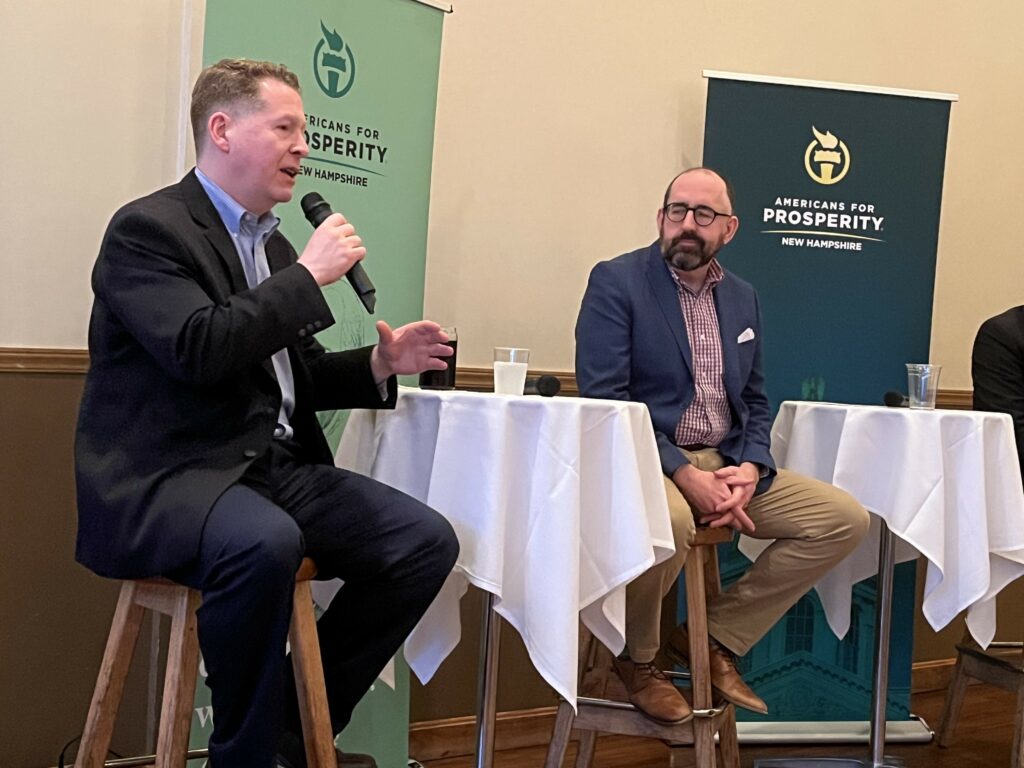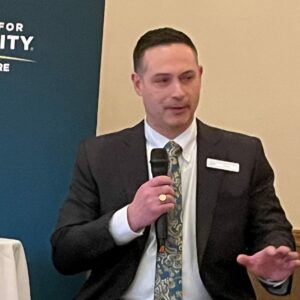New Hampshire doesn’t have an ESG investment problem — yet — but the state wants to play a key role in its national solution.
“We are involved with this litigation because New Hampshire needs someone speaking for our folks. We’re a small state,” said Mark W. Dell’Orfano, an attorney with the New Hampshire Department of Justice. “This is a good opportunity to work with other bigger states to ensure our interests are advanced.”
Dell’Orfano filled in for Attorney General John Formella at a Manchester roundtable on the Biden administration’s new rule on private-sector retirement fund managers’ responsibilities and “environment, social and governance” investment policies. Formella signed New Hampshire onto a lawsuit filed by 25 Republican state attorneys general challenging the federal Department of Labor’s new rule. (Formella had been scheduled to speak but missed it due to illness.)

AFP-NH State Director Greg Moore (left) joins Richard Morrison to discuss new ESG investing rules in Manchester, N.H., on March 23, 2023.
The event, hosted by Americans For Prosperity New Hampshire, was held just days after President Joe Biden vetoed a bipartisan resolution that would have stopped the Labor Department’s revision to Employee Retirement Income Security Act (ERISA) rules. One speaker, Richard Morrison, a senior fellow at the Competitive Enterprise Institute, has written extensively on ESG investing.
Under ERISA, Morrison explained, managers of private retirement funds “had to invest with the best interests of your beneficiaries as the priority.” But before ESG, there were CSR (corporate social responsibility) and SRI (socially responsible investing), he said, movements to add other considerations beyond financial results to the investing mix.
“People were asking, ‘Can we also invest to help an environmental initiative? Help organic banana farmers in Ecuador?’ The policy statements [in response] were that for the most part, you had to invest based on results,” Morrison said. The Trump administration reiterated the “fiduciary first’ stance with a 2020 rule, but Biden has now reversed it.
“The Biden administration said, ‘Well, actually, you can use environmental and social factors to guide investment decisions even when investing for retirees.’ You still have a responsibility to the beneficiaries, but it opens the door for these other investment decisions.”
Morrison’s view was echoed by Boston attorney Marcia S. Wagner, one of the nation’s leading ERISA attorneys, in a recent Forbes interview.
“The DOL [Department of Labor] regulations do not require ESG factors to be taken into account in evaluating investments. Rather, the regulations would permit ESG factors to be taken into account.”
Both Formella and Gov. Chris Sununu have previously declared their opposition to the new rule. New Hampshire is one of the best states to retire, and the State House Republicans are trying to build on that success by phasing out the tax on interest and dividends income — a policy Democrats oppose.
“The impact of the Department of Labor’s new rule cannot be understated, as it affects trillions of dollars of retirement assets that belong to millions of retirees, and it comes at a time of uncertainty in the economy and the stock market,” Formella told NHJournal. “The rule is wholly inconsistent with ERISA’s mandate that fund managers focus solely on maximizing financial benefits for current and future retirees when investing their assets.
“Because of the harm that this illegal rule would cause, at a particularly precarious time for the economy and stock market, I felt a strong obligation to join my fellow attorneys general around the country to file a lawsuit to challenge the rule. We believe that we have strong legal arguments and we are confident that we will prevail.”
Dell’Orfano said while states like Oklahoma and Texas are fighting ESG because it discourages investment in important local industries like oil and natural gas, New Hampshire’s motivation is consumer protection.
“ERISA is supposed to protect people’s retirement funding,” Dell’Orfano explained. “These pension [managers] aren’t supposed to be making qualitative decisions about environment or social or governance. They really are there to make money for people. This is about consumer protection, especially for businesses here in New Hampshire that would be subject to these pension rules.
“At the end of the day, folks want to make sure that they have a nice nest egg.”
New Hampshire House Republicans who attended the event said they are looking for ways the state can take legislative action to lessen the impact of the new ESG factors. Sununu has suggested the state might use its pension as part of an effort to push back against the policy. However, Dell’Orfano reminded the audience the new rule “has nothing to do with public pensions.” And federal law would likely supersede state actions.
The multi-state lawsuit is ongoing, with the Biden administration asking the federal courts for a change of venue away from a Trump-appointed judge in Texas and, they would prefer, to a court in Washington, D.C. Critics say it is a blatantly political move. If it is, it would not be the first in this case.
“If [Biden] did not veto this congressional resolution, he would have faced a severe backlash from the progressive segment of the Democrat Party,” Wagner said, “That is not to say that President Biden does not, in fact, fully support the permissibility of taking into account ESG factors to the extent permissible under the DOL regulations as a necessary measure to protect retirement plan investors.
“It’s simply to recognize the political reality.”



